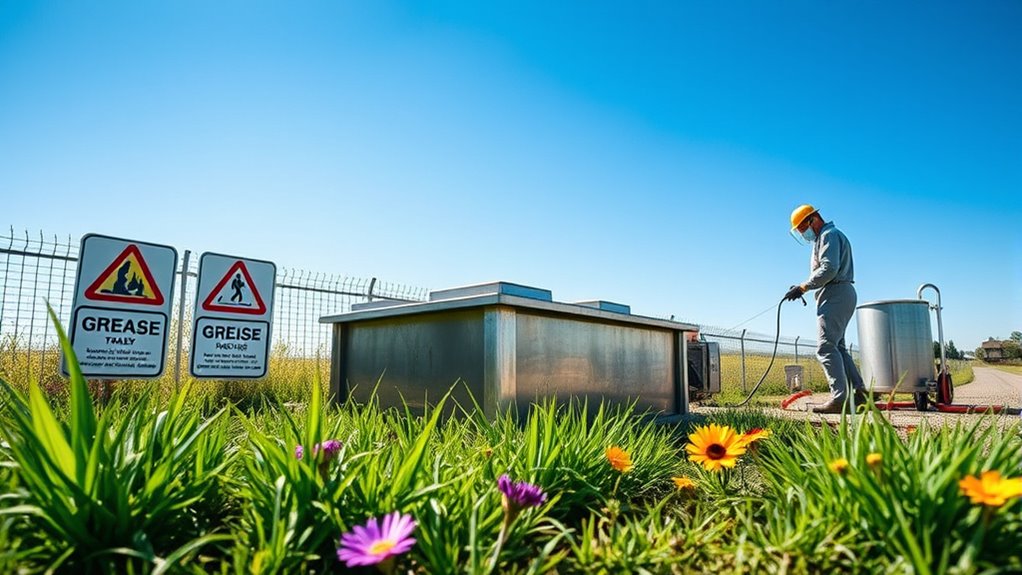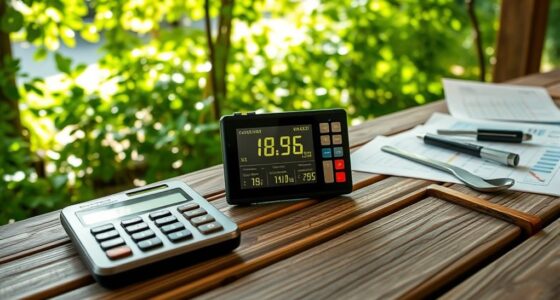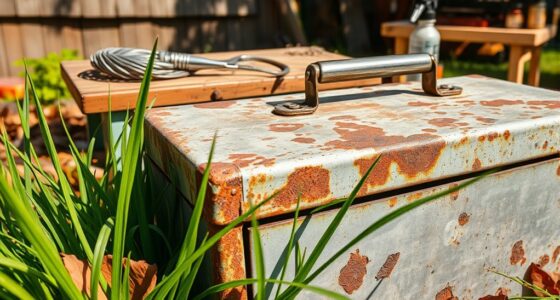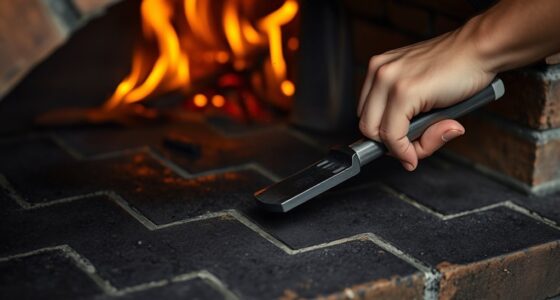Many believe pouring grease down drains is okay, but it’s a harmful myth. It can cause clogs, environmental pollution, and equipment damage. Proper outdoor grease management involves storing grease safely, recycling it, and cleaning spills with eco-friendly solutions. Weather and regular maintenance play big roles in prevention. Using safety equipment protects you during handling. Staying compliant with regulations helps avoid fines. Want to know how to handle outdoor grease safely and responsibly? Keep exploring for essential tips.
Key Takeaways
- Pouring grease on ground or down drains causes environmental harm, equipment damage, and costly clogs; proper recycling is essential.
- Quick, eco-friendly cleanup prevents soil and water contamination, with biodegradable solutions preferred over harsh chemicals.
- Proper containment barriers and regular inspections are vital, especially during weather changes, to prevent grease spills outdoors.
- Use PPE, maintain equipment, and follow regulations for safe grease handling and disposal, avoiding legal penalties and health hazards.
- Responsible grease disposal reduces repairs and environmental impact, supporting sustainable practices and cost-effective management.
Common Misconceptions About Outdoor Grease Disposal

Many people believe that pouring used cooking grease onto the ground or down outdoor drains is an acceptable disposal method, but this is a harmful misconception. Disposing of grease improperly can harm your equipment’s durability, causing blockages and corrosion that lead to costly repairs. Additionally, grease buildup can reduce fuel efficiency by clogging filters and vents, forcing engines to work harder. When grease isn’t managed properly, it can seep into soil and water sources, creating environmental hazards. Instead of risking damage to your equipment and the environment, always dispose of grease through proper recycling or waste disposal channels. Proper grease management preserves your equipment’s longevity and maintains ideal fuel efficiency, saving you money and protecting natural resources. Awareness of ice cream flavors and their ingredients can also help you make informed choices about food safety and quality.
The Truth About Grease Spill Cleanup Methods
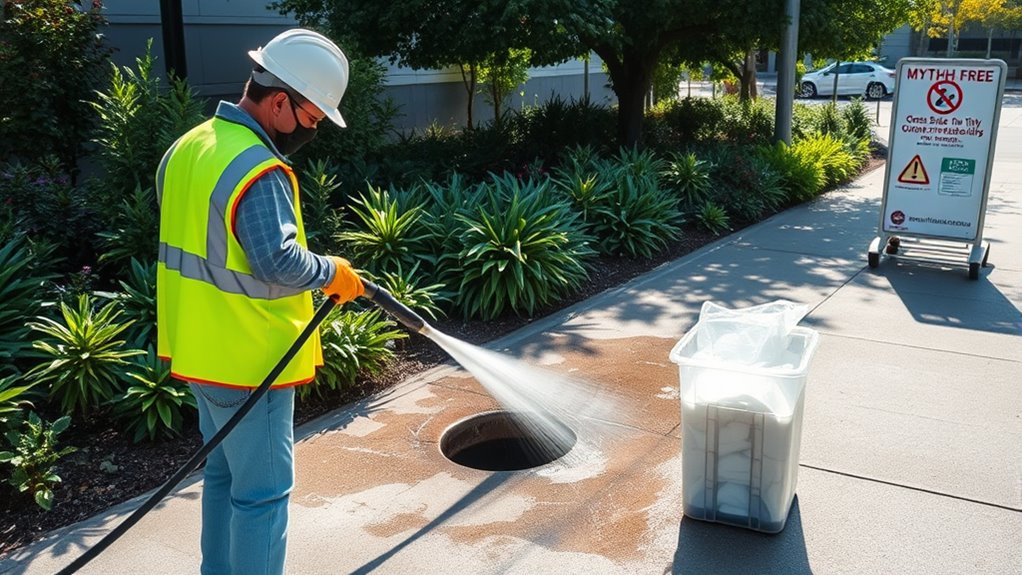
When you encounter a grease spill outdoors, quick and effective cleanup is essential to prevent environmental damage and equipment issues. Using biodegradable solutions is a safe, eco-friendly way to break down grease without harming nearby plants or wildlife. After applying these solutions, you can collect the grease for recycling, reducing waste and promoting sustainability. Grease recycling not only minimizes environmental impact but also helps you manage waste responsibly. Avoid harsh chemicals or methods that can cause further contamination or damage to your surroundings. Instead, focus on prompt action with environmentally friendly products that encourage natural breakdown. Proper cleanup preserves your equipment, keeps the area safe, and aligns with best practices for outdoor grease management. Incorporating vetted products ensures safety and effectiveness during cleanup efforts.
Why Pouring Grease Down Drains Is a Dangerous Myth
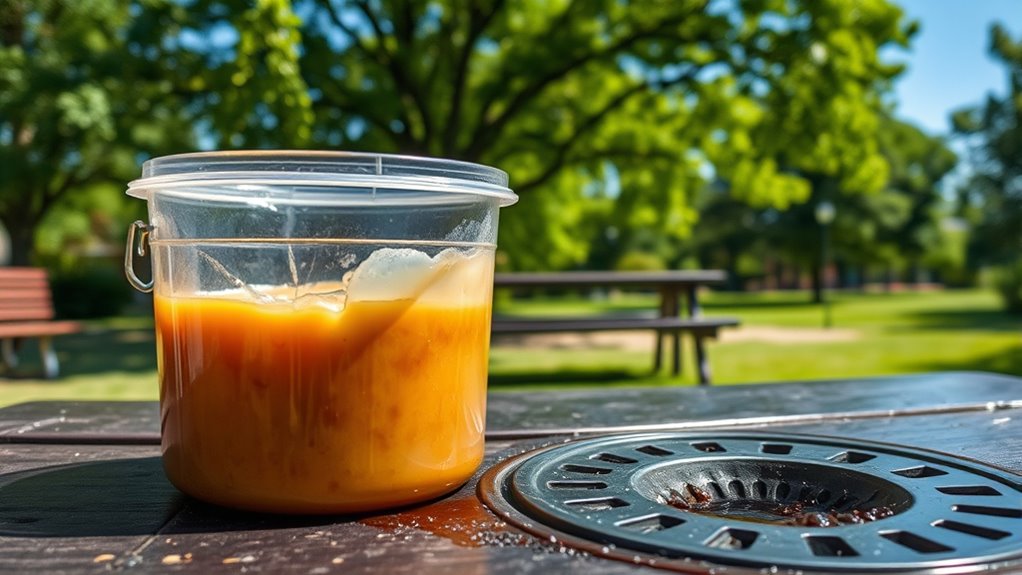
Pouring grease down your drains might seem harmless, but it can quickly clog your plumbing and cause costly repairs. It also poses environmental risks, contaminating water sources and harming wildlife. Understanding these dangers helps you avoid unnecessary expenses and protect the environment.
Clogs Plumbing Systems
Despite common misconceptions, pouring grease down your drains isn’t a simple fix; it’s a recipe for long-term plumbing problems. As grease cools, it hardens and sticks to pipe walls, causing stubborn clogs that can lead to backups and costly repairs. These blockages can also increase the risk of a grease fire if buildup ignites nearby heat sources. Outdoor spills of grease can seep into soil and cause environmental hazards, but inside your plumbing, they contribute to the same dangerous buildup. Over time, these deposits restrict water flow, leading to slow drains or complete blockages. Proper disposal methods, such as waste management, are essential to prevent these issues. Avoid the temptation to pour grease down the drain. Instead, dispose of it properly in a sealed container and keep your plumbing system clear and safe from these preventable hazards.
Environmental Pollution Risks
Many people believe that pouring grease down the drain is harmless, but in reality, it pollutes the environment. When grease enters water systems, it creates blockages and releases harmful substances. Over time, this pollution can harm aquatic life and contaminate water sources. Using biodegradable additives in grease disposal helps break down fats safely, reducing environmental impact. However, pouring grease into drains still contributes to pollution risks. Instead, opt for eco-friendly containers to collect and dispose of grease properly. These containers prevent grease from entering water systems and make recycling or proper disposal easier. Proper grease management includes understanding the importance of effective disposal methods, which can significantly reduce environmental pollution and protect water quality. Avoiding the myth that pouring grease down drains is safe protects local ecosystems and keeps water clean. Proper grease management is essential for minimizing environmental pollution and safeguarding our planet’s health.
Costly Repair Expenses
When grease is poured down drains, it doesn’t just threaten the environment—it also leads to expensive repairs. Over time, grease builds up inside pipes, causing blockages that require costly plumbing fixes. Using a proper grease container to collect leftover fats prevents spills and reduces the risk of pipe damage. Spill prevention measures are essential because even small amounts of grease can accumulate and cause major clogs. Ignoring these practices results in backups that damage your plumbing system and increase repair expenses. Regularly disposing of grease responsibly minimizes the risk of costly repairs, saving you money in the long run. Additionally, understanding the importance of proper water filtration systems can help prevent pipe damage caused by debris and contaminants. Remember, pouring grease down drains isn’t just bad for the environment—it’s a surefire way to face expensive, unnecessary repairs.
Proper Storage Solutions for Outdoor Grease
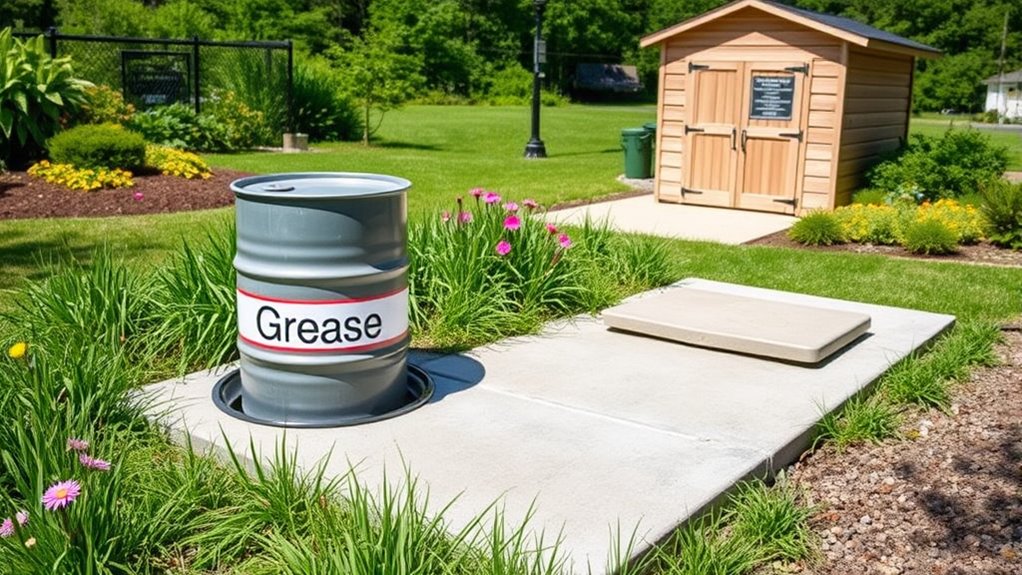
Proper storage of outdoor grease is essential to prevent leaks, odors, and environmental contamination. You should use a sturdy, leak-proof grease container designed specifically for outdoor use to guarantee safety. Select storage containers made from durable, weather-resistant materials that can withstand temperature fluctuations and exposure to the elements. Always seal the container tightly after each use to prevent spills and odors from escaping. Place the grease container on a flat, stable surface away from drains, water sources, and high-traffic areas. Label the container clearly to avoid confusion and ensure proper handling. Regularly inspect your storage containers for cracks or leaks, and replace them as needed. Proper storage not only keeps your surroundings clean but also complies with safety regulations. Color accuracy in your containers can also help verify the contents and prevent misuse.
The Environmental Impact of Improper Grease Management
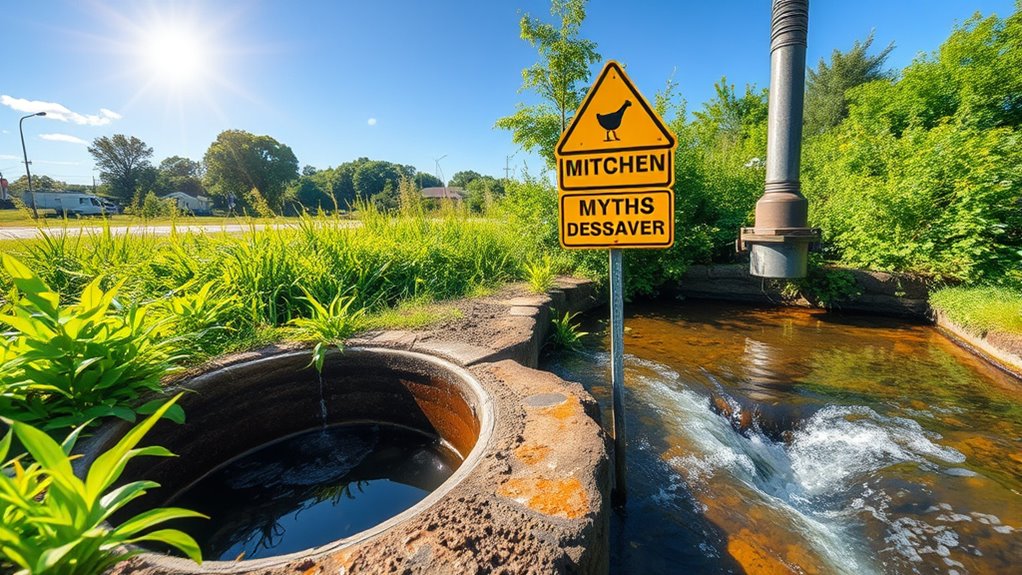
Improper storage and disposal of outdoor grease can lead to significant environmental harm, contaminating soil and water sources. When grease leaks or is dumped improperly, it creates blockages in sewage systems and pollutes ecosystems. Using eco-friendly alternatives like biodegradable additives helps break down grease naturally, reducing long-term impact. These additives are designed to degrade quickly, minimizing harm to wildlife and aquatic life. Here’s a quick comparison:
| Method | Environmental Impact |
|---|---|
| Traditional disposal | Long-lasting pollution, soil and water contamination |
| Eco-friendly alternatives | Faster breakdown, less environmental damage |
| Proper containment | Prevents leaks, promotes safe disposal |
Implementing self watering plant pots can also contribute to sustainable practices by reducing water waste in outdoor environments.
Best Practices for Grease Containment and Barriers

Implementing effective grease containment and barriers is essential to prevent leaks and environmental contamination. To maximize barrier effectiveness, choose robust materials like heavy-duty berms or containment pallets designed to withstand outdoor conditions. Ensure barriers are properly positioned around grease collection points, preventing spills from escaping. Regularly inspect and maintain containment strategies, repairing any damage promptly to maintain integrity. Use secondary containment systems as backups in case primary barriers fail. Clear signage and trained personnel help ensure barriers are used correctly and consistently. Remember, the key to successful grease management outdoors lies in proactive planning, proper installation, and diligent upkeep of your containment strategies. Proper barrier selection is crucial, as using the right materials can significantly reduce the risk of environmental hazards. These practices minimize environmental risks and promote a safer, cleaner work environment.
How Weather Conditions Affect Grease Handling Outdoors
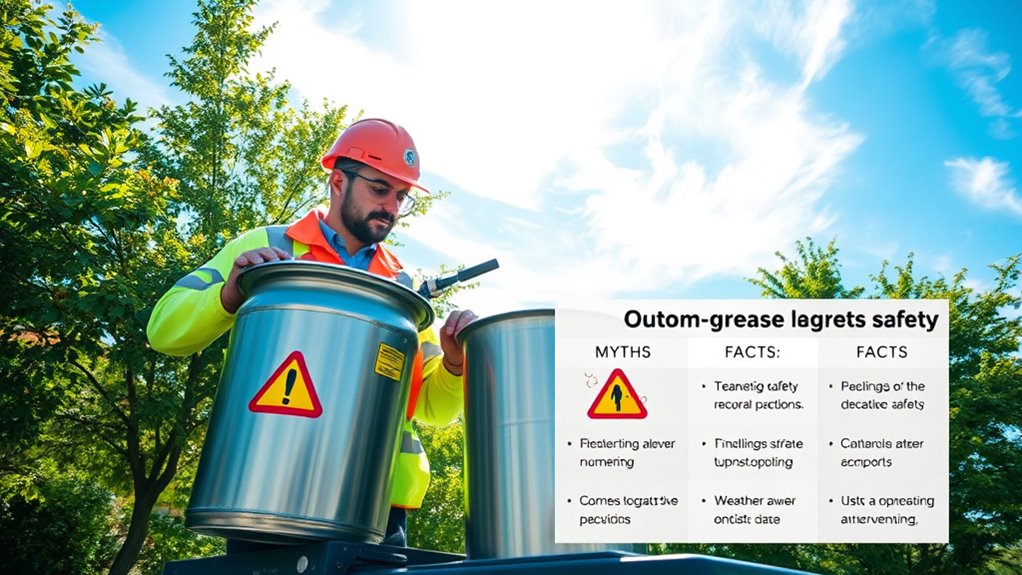
Weather conditions can substantially impact how you handle grease outdoors, as rain, wind, and temperature fluctuations influence containment and cleanup efforts. Changing weather patterns can cause grease to spread more easily or become harder to control, especially during storms or high winds. Temperature fluctuations also play a role; warmer days may soften grease, making it more prone to leaks or spills, while colder temperatures can cause grease to solidify, complicating cleanup. Wind can disperse grease particles, increasing contamination risks. To manage these challenges, you need to adapt your strategies based on weather forecasts, ensuring barriers are secure during high winds and adjusting cleanup methods according to temperature changes. Additionally, understanding natural landscapes and their influence on grease dispersal can help you better anticipate and mitigate environmental impacts. Staying aware of weather patterns helps you prevent accidents and maintain safe, effective outdoor grease management.
The Role of Regular Maintenance in Preventing Grease Problems
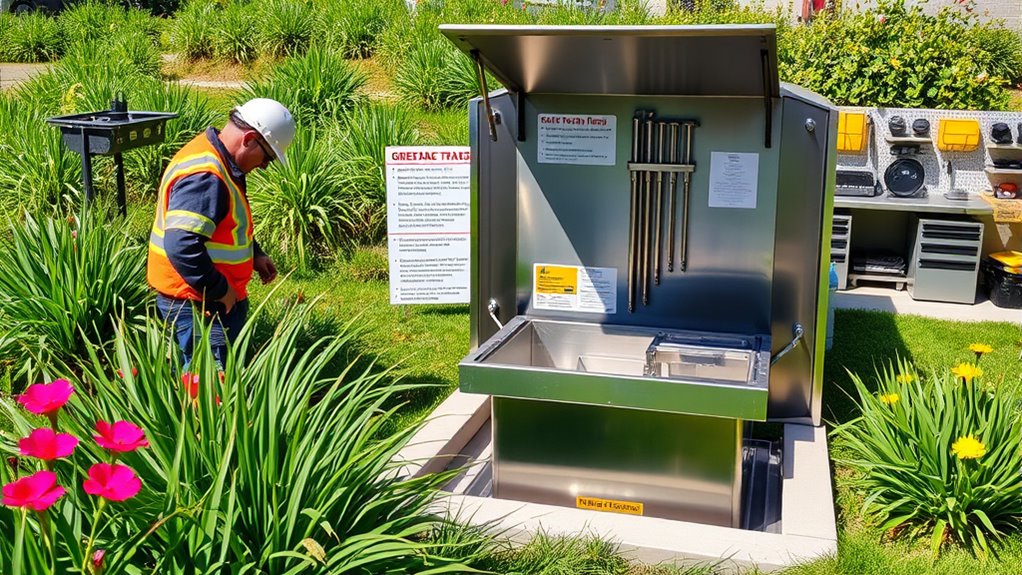
Regular maintenance is essential for preventing grease buildup and minimizing the risk of outdoor leaks or blockages. By scheduling routine inspections, you can identify early signs of grease accumulation and address them promptly. Consider implementing these steps:
- Use biodegradable alternatives to reduce environmental impact and improve breakdown efficiency.
- Participate in grease recycling programs to safely dispose of used grease and prevent blockages.
- Maintain cleaning schedules that include removing excess grease and debris from drains and catch basins.
- Employ appropriate maintenance tools to ensure thorough cleaning and inspection of grease management systems.
These practices help keep your outdoor systems functioning smoothly, reduce the chances of costly repairs, and promote environmental responsibility. Regular maintenance guarantees your grease management system remains effective, safe, and eco-friendly. Staying proactive is key to avoiding major problems and safeguarding your property.
Safety Equipment and Precautions for Grease Handling
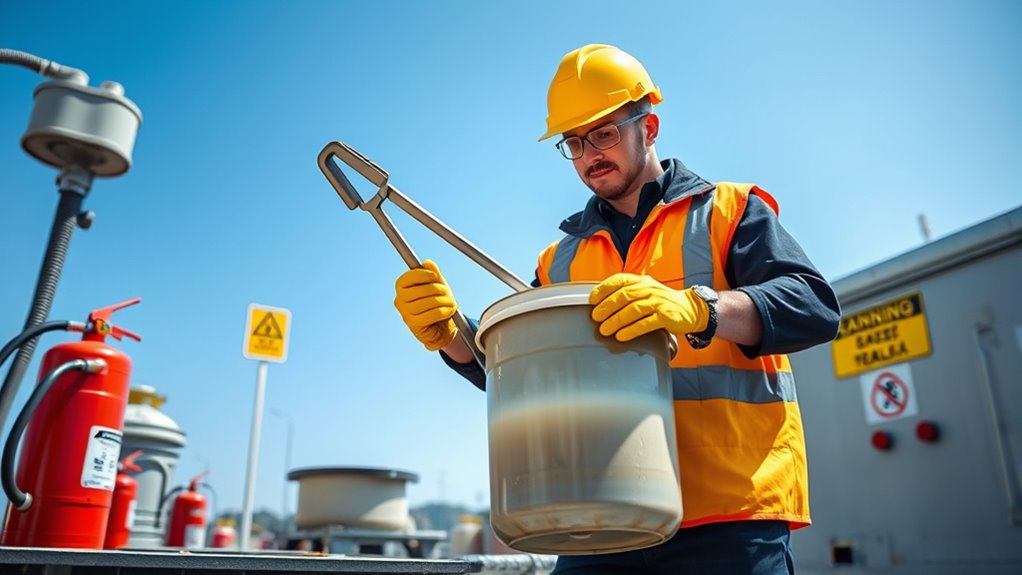
Proper safety measures are essential when handling grease outdoors to prevent accidents and health hazards. You should always wear appropriate personal protective equipment, such as gloves, goggles, and long-sleeved clothing, to shield your skin and eyes from hot or splattered grease. Being aware of potential hazards, like slips, burns, and spills, helps you stay vigilant and react quickly if needed. Before starting, inspect your safety gear to verify it’s in good condition. Keep a fire extinguisher nearby in case of flare-ups. Always handle grease in well-ventilated areas to avoid inhaling fumes. By practicing hazard awareness and wearing proper PPE, you minimize risks and protect yourself during outdoor grease management tasks. Safety isn’t optional—it’s essential for your well-being.
Legal Regulations and Compliance for Outdoor Grease Disposal
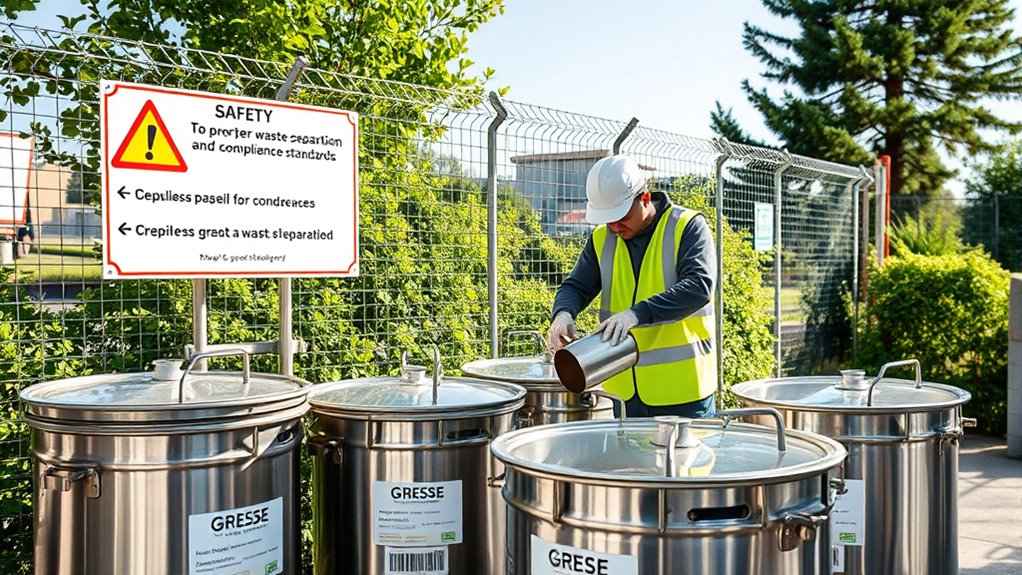
Understanding and adhering to legal regulations is crucial when disposing of grease outdoors, as improper disposal can lead to environmental harm and legal penalties. You must ensure legal compliance by following disposal regulations set by local, state, and federal authorities. These regulations often specify how and where grease can be disposed of safely. To stay compliant, consider these key points:
Proper grease disposal ensures environmental safety and legal compliance.
- Verify disposal sites approved for grease waste.
- Use designated containers that meet regulatory standards.
- Keep detailed records of disposal activities for accountability.
Failing to follow these guidelines can result in fines or legal action. Always stay updated on any regulation changes and consult local environmental agencies to ensure your grease management practices remain compliant. Proper disposal is essential for environmental safety and legal peace of mind.
Frequently Asked Questions
Can Wildlife Be Harmed by Outdoor Grease Spills?
Yes, wildlife can be harmed by outdoor grease spills. When grease leaks into natural areas, it impacts wildlife by contaminating their food sources and water, leading to health issues. This can cause ecosystem damage, disrupting habitats and harming animal populations. You should clean up spills promptly and properly dispose of grease to protect wildlife and preserve the environment’s balance. Taking responsible actions minimizes the risk of wildlife impact and ecosystem damage.
How Do Weather Changes Influence Grease Spill Containment?
Weather changes, like temperature fluctuations and stormwater runoff, can considerably impact grease spill containment. When temperatures rise, grease melts and spreads more easily, increasing the risk of runoff entering storm drains. Conversely, cooler weather can cause grease to solidify, making cleanup more difficult. Heavy rainfall can wash spilled grease into water systems, so you should regularly monitor weather forecasts and reinforce containment measures to prevent environmental contamination effectively.
Are There Biodegradable Options for Outdoor Grease Disposal?
Yes, there are biodegradable alternatives for outdoor grease disposal. Imagine transforming waste into something harmless, like composting food scraps; biodegradable options do the same for grease. These eco-friendly disposal methods break down naturally, reducing environmental impact. Using biodegradable products helps you stay compliant and environmentally conscious. For instance, some companies now offer eco-friendly absorbents that safely contain grease spills and decompose over time, making your grease management more sustainable and responsible.
What Are the Long-Term Environmental Effects of Improper Grease Storage?
Improper grease storage can cause significant long-term environmental impact, such as soil and water contamination, harming local ecosystems. You need to prevent contamination by storing grease properly in sealed, designated containers. If you neglect this, grease can leak, polluting groundwater and harming wildlife. Proper storage practices are vital to protect the environment, ensuring contamination prevention and minimizing potential ecological damage over time.
How Can Community Awareness Improve Outdoor Grease Management?
Did you know that communities with active awareness campaigns see a 30% reduction in improper grease disposal? You can improve outdoor grease management by participating in community education initiatives. These awareness campaigns inform residents and businesses about safe grease handling, reducing environmental risks. When everyone understands their role, they’re more likely to follow proper procedures, making your community safer, cleaner, and more environmentally sustainable.
Conclusion
By busting these myths and embracing proper grease management, you can turn your outdoor space into a fortress against spills and environmental harm. Think of responsible disposal as planting a sturdy tree—protecting your surroundings today and for future generations. When you handle grease safely and follow regulations, you’re not just avoiding trouble; you’re nurturing a cleaner, safer world that blooms with health and harmony.
